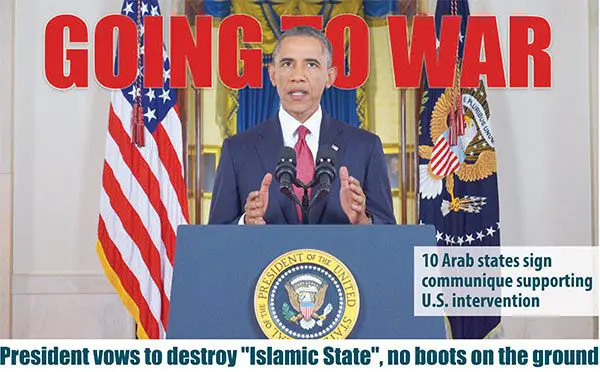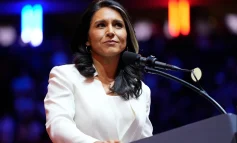
WASHINGTON — President Barack Obama’s new strategy to “degrade, and ultimately destroy” the Islamic State is being met with widespread skepticism among both hawks and doves, as well as regional specialists.
While Congress is expected to acquiesce, if not formally authorize, the plans he outlined in his nationally televised prime-time speechWednesday night, lawmakers on both sides of the aisle have not been shy about expressing reservations.
“While the president presented a compelling case for action, many questions remain about the way in which [he] intends to act,” said Republican House Speaker John Boehner.
Indeed, while he adopted a determined and confident tone that won plaudits even from Republicans like Boehner, it is no secret here that Obama, who has made Washington’s extraction from Middle East wars a legacy issue for his presidency, has consistently resisted pressure to escalate U.S. military involvement in the region.
Speaking on the eve of the 13th anniversary of al-Qaeda’s 9/11 attacks on New York and the Pentagon, Obama announced that he will increase U.S. support for Iraq’s army and the Kurdish Peshmerga with more training, intelligence, and equipment and will dispatch 475 U.S. military personnel to join the 1,000-plus who have deployed there since ISIS swept across much of the northern and central part of Iraq in June.
At the same time, he pledged that the campaign “will not involve American combat troops fighting on foreign soil.”
In addition, he said the U.S. will carry out airstrikes against ISIS targets “wherever they exist,” not only in Iraq, but, most significantly, in Syria, as well.
Washington, he said, is also assembling “a broad coalition of partners,” including NATO, and, more importantly, the Sunni-led Gulf states, Jordan, and Lebanon whose governments pledged support for the anti-ISIS campaign and the new government of Iraqi Prime Minister Haider Al-Abadi, during a meeting Thursday with Secretary of State John Kerry in Jiddah.
And Obama asked Congress to swiftly approve a pending request for 500 million dollars to train and equip anti-government and anti-ISIS Syrian rebels.
Saudi Arabia, a major backer of various factions in the three-year insurgency against President Bashar al-Assad, has agreed to host training camps for these “moderate” rebels, according to administration officials.
This “comprehensive and sustained counter-terrorism strategy” – which he compared to Washington’s long-standing operations in Yemen and Somalia — will “take time to eradicate a cancer like ISIL (Islamic State of Syria and the Levant),” Obama said, using the administration’s preferred acronym.
While the plan gained guarded approval from most lawmakers – who, facing mid-term elections in November, are particularly sensitive to a sudden hawkish shift in public opinion – many said it raised as many questions as it answered, including whether Obama has the legal authority to order strikes against ISIS, especially in Syria, without getting explicit Congressional authorization.
At the same time, hawks questioned whether the strategy – notably Obama’s pledge not to introduce combat troops – was sufficient to achieve its goals.
“Obama’s ‘strategy’ has no chance of success,” wrote Frederick and Kimberly Kagan of the neo-conservative American Enterprise Institute (AEI) and the Institute for the Study of War, respectively, on the Weekly Standard’s website.
The two Kagans, who helped devise the Bush administration’s “Surge” to curb Iraq’s civil war in 2007, argued that a counter-terrorism strategy would not work against a full-fledged insurgency, which they said ISIS has become.
“It’s awfully hard to develop a sound strategy when you start by misdiagnosing the problem so profoundly,” they wrote. Frederick Kagan has argued that 10-15,000 U.S. troops are necessary for Iraq alone.
Others disagreed. “Getting more U.S. troops on the ground is precisely what … [ISIS chief Abu Bakr] Al-Baghdadi wants,” Col. Lawrence Wilkerson (ret.), former Secretary of State Colin Powell’s chief of staff, said. “A target-rich environment is what they want, and in their area.”
“The speech left major questions about Syria unanswered,” said Paul Pillar, a former top CIA Middle East analyst. “If ISIS is to be set back, who fills that vacuum? If it is the Assad regime, how does that square with the continued U.S. opposition to that regime? If it is supposed to be someone else, how does that square with the persistent lack of unity, strength, and credibility of the so-called moderate opposition?”
“If the air strikes do not ‘defeat’ ISIS, what policy will the president pursue considering that he ruled out putting boots on the ground?” asked Emile Nakhleh, a former director of the CIA’s political Islam strategic analysis programme.
He also questioned the commitment of the Sunni Arab states that signed on to the strategy in Jiddah “considering that domestic radical Islamists are already posing a serious challenge to such countries as Saudi Arabia and Jordan.”
Jim Lobe’s blog on U.S. foreign policy can be read at Lobelog.com. -IPS, TAAN






Leave a Reply